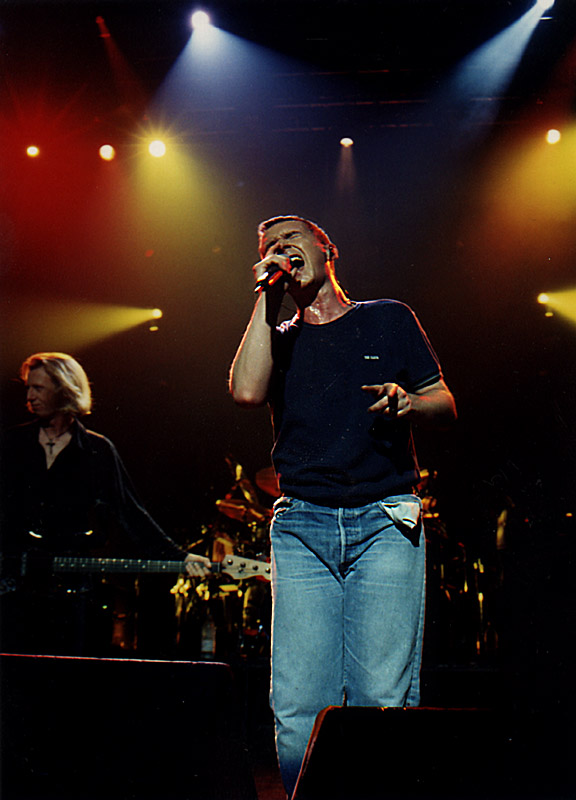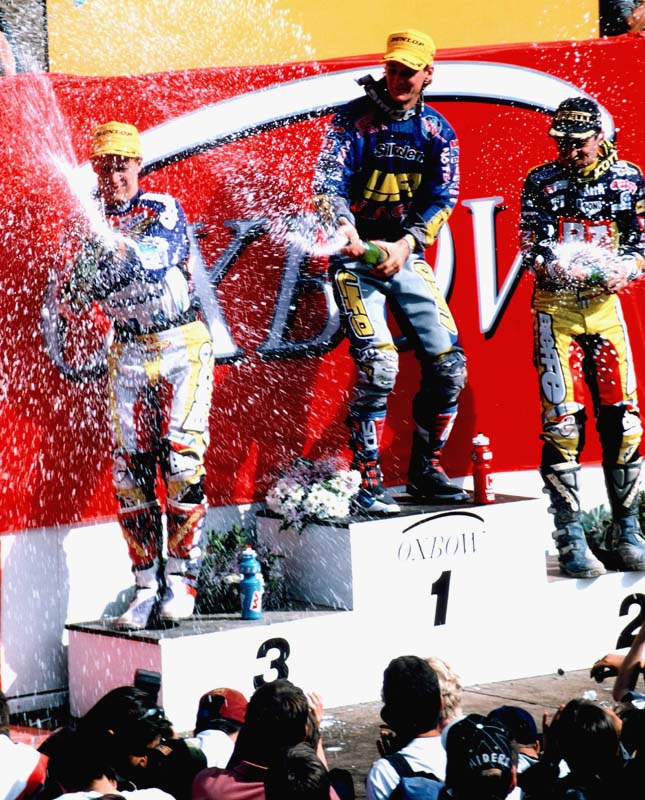Page 2 of 3
Re: Cameras
Posted: Wed Jan 20, 2010 8:13 pm
by B-Ry
I mostly agree with photomike... only comment I have is, that possibly one thing I learnt from buying the cheaper lenses... especially if you are doing the manual shooting, cheap lenses very quickly need to be replaced. With my last camera I ended up biting the bullet and waiting a little longer to get the more expensive lenses. Now almost every photo I take comes out great (well quality wise anyway).
I also use Canon lenses. As a slight change to the above, I have a 17-55mm lens (this lens cost me $1600 alone) and yet after that I bought 2 lenses much cheaper... my favourite lens is an 85mm, one thing no one ever brings up... the f stop on the lens is very important. Most cheap lenses have a max aperature of 4-5.6, you may find that you can not get any better pictures with that lens then with a little compact camera. With that in mind this is why I believe it is much better to hold off on a purchase till you get a better lens.
This applies to all dSLRs
Re: Cameras
Posted: Wed Jan 20, 2010 9:25 pm
by dilligaf
was getting a compact camera for my wife to take overseas today and saw teds and jb hifi both had digital slr's in your price range
eg
http://www.teds.com.au/www/6/1001102/di ... 1152_.html
http://www.jbhifi.com.au/photo/digital- ... s-nav-1009
I imagine they are up your way too?
dick smith had a more limited range. eg.
http://www.dse.com.au/cgi-bin/dse.store ... iew/XG3646
often buy stuff from them as they price match and their warranties etc are good.
Re: Cameras
Posted: Wed Jan 20, 2010 10:03 pm
by photomike666
B-Ry wrote:I mostly agree with photomike... only comment I have is, that possibly one thing I learnt from buying the cheaper lenses... especially if you are doing the manual shooting, cheap lenses very quickly need to be replaced. With my last camera I ended up biting the bullet and waiting a little longer to get the more expensive lenses. Now almost every photo I take comes out great (well quality wise anyway).
I also use Canon lenses. As a slight change to the above, I have a 17-55mm lens (this lens cost me $1600 alone) and yet after that I bought 2 lenses much cheaper... my favourite lens is an 85mm, one thing no one ever brings up... the f stop on the lens is very important. Most cheap lenses have a max aperature of 4-5.6, you may find that you can not get any better pictures with that lens then with a little compact camera. With that in mind this is why I believe it is much better to hold off on a purchase till you get a better lens.
This applies to all dSLRs
I beg to differ on the lenses. When I started out in Rock photography I did not a great deal of money, and spent a couple of years with Sigma lenses. 28-70 & 70-210, both f4:F5.6. I got some of the most amazing pics on 35mm negs/slide in the low light of a rock concert. I started this in '92, still have both lenses and both still perform admirably. Sure, high res enlargements (300+dpi) above A3 size and you'll start to notice the difference from the Canon lenses, but still good enough to learn photography and make prints to semi pro level.
As for Aperture capability, the large aperture (lower F number) will allow a very short depth of field, or will allow faster shutter speeds in low light, but both of these are extreme exceptions and in general photography there are ways around without spending the big bucks. We are considering someone learning to be a photographer, not a pro who needs all eventualities covered.
These were taken with a Sigma lens in 96/97...

- Danny - Thunder
- danny.jpg (109.25 KiB) Viewed 3367 times

- 1996 World 250xx Moto X UK round
- podiumraw.jpg (156.58 KiB) Viewed 3367 times
Re: Cameras
Posted: Wed Jan 20, 2010 10:52 pm
by Rossi
Speaking of such young Michael my boy,
why haven't you bought a slide scanner and converted them to digital images .......................
I must have some original Donington Monsters of rock photo's around here somewhere

Re: Cameras
Posted: Thu Jan 21, 2010 4:43 am
by the kid
the large aperture (lower F number) will allow a very short depth of field, or will allow faster shutter speeds in low light, but both of these are extreme exceptions
Not sure that I agree entirely with this Mike . Taking shots of bikes racing would not be considered an extreme exception , especially around here . That is where a fast lens is going to make a world of difference .
Re: Cameras
Posted: Thu Jan 21, 2010 3:43 pm
by photomike666
the kid wrote:the large aperture (lower F number) will allow a very short depth of field, or will allow faster shutter speeds in low light, but both of these are extreme exceptions
Not sure that I agree entirely with this Mike . Taking shots of bikes racing would not be considered an extreme exception , especially around here . That is where a fast lens is going to make a world of difference .
Why?
You're outside so light is generally good, so you can run a fast shutter speed without needing an aperture of F2, F4 would be perfectly OK. Also, with such a wide aperture your depth of field is so narrow it becomes hard to get really sharp focus. Remember the further away you are the longer lens you use and the narrower the depth of field. F4 at 200mm will give a depth of field of less than 30cm. If the riders shoulder is in focus, his face is out of focus. For bikes you rarely need a shutter speed much faster than 1/500sec, esp in the corners, so you can put the aperture at around F5.6-F8. On the straights it's better to use a slower shutter speed with a smaller aperture and pan with the bike to blur the background...
Re: Cameras
Posted: Thu Jan 21, 2010 9:34 pm
by tim
photomike666 wrote:.................it's better to use a slower shutter speed with a smaller aperture and pan with the bike to blur the background...
OOORRRRR Blurr in the foreground!!!

(this was taken at f4 ISO320 200mm 1/1250)
Re: Cameras
Posted: Fri Jan 22, 2010 10:58 am
by Smitty
[quote="tim........
(this was taken at f4 ISO320 200mm 1/1250)[/quote]
in English...?????

Re: Cameras
Posted: Fri Jan 22, 2010 11:44 am
by tim
Smitty wrote:tim wrote:........
(this was taken at f4 ISO320 200mm 1/1250)
in English...?????

This was taken with a reasonably big hole in the lens, at a reasonably low sensitivity to light, and a reasonably long focal length, at quite a fast shutter speed.

Re: Cameras
Posted: Fri Jan 22, 2010 12:16 pm
by photomike666
For the record
Aperture is denoted in 'F' stops. An average lens has it's largest aperture at around F4, an expensive lens may expand the iris to F1.8. Each stop halves the amount of light the lens lets in.
F2.8 : F4 : F5.6 : F8: F11: F16 : F22 Many cameras allow half stops. Aperture affects the focus allowing the background of a portrait to be out of focus (large aperture), or a whole landscape to be in focus (Small aperture)
Shutter speed is denoted in fractions of seconds. In old world point and shoot cameras they had two settings; Sunny and Cloudy (1/250 sec & 1/125sec). Again each full stop halves the amount of light reaching the 'film' and half stops are usually available.
1 sec, 1/2, 1/4, 1/8, 1/16, 1/32, 1/60, 1/125, 1/250, 1/500, 1/1000 etc. The shutter speed affects the image be bluring or freesing movement
ISO is related to the sensivity of the film (or CCD in modern new fangled cameras). In film terms it related to the size of siver halide grains. Smaller grains caught less light but gave a very clear picture (slow film 25-200iso), larger grains caught more light but gave a grainier picture (fast film 400-3200iso). Again film speed generally doubled the amount of light sensivity, and digital camera sensor sensivity is aimed to replicate this and more sensitive settings iso 800+ give pixalisation.
iso 50, 100, 200, 400, 800, 1600, 3200. Again half stops are available.
The idea that each setting reduced or increases light by 1/2 makes changing settings to give a required effect whils still getting the correct amount of light easy. Your meter tells you to use 1/1600sec at F4, you could reduce the shutter speed by two stops = 1/400sec letting in 4 times more light, and change the aperture to F8 to let in 4 times less light. Same exposure, more depth of field possibly more blur.
Re: Cameras
Posted: Sat Jan 23, 2010 9:23 pm
by B-Ry
talking of taking the shots of bikes, I agree with mick... the best photo I have ever taken I set the f-stop to f10 and a shutter of 1/160 with ISO 100. That allowed a great depth of field whilst blurring the background, and the spokes of the wheel were blurred. Having a faster shutter speed makes the bike look like it is standing still (Boring)
All I am saying in regards to the lenses. With my older lenses I was always dissapointed with the results of photos I took, I upgraded to a lens that was better quality and almost instantly the photos were coming out cleaner, then upgraded to my favourite 2 lenses (both f1.

now unless I really can't frame a photo in either of those lenses, I never use the other lenses.
So my point is... whilst sure the cheaper lenses do the job and can take great pictures. It becomes a lot more expensive to purchase a $300 lens only to want to buy another lens making the first redundant.
Re: Cameras
Posted: Sat Jan 23, 2010 9:33 pm
by tim
Jennysc wrote: She has about $700 to play with.

Re: Cameras
Posted: Sun Jan 24, 2010 6:41 pm
by photomike666
Oh, one vital tip - when you've just ridden 170km to Phillip Island on boring freeways with the digital SLR packed in the tank bag, it's really important to have a memory card in it!
Re: Cameras
Posted: Sun Jan 24, 2010 7:00 pm
by B-Ry
photomike666 wrote:Oh, one vital tip - when you've just ridden 170km to Phillip Island on boring freeways with the digital SLR packed in the tank bag, it's really important to have a memory card in it!
haha great tip there! That has got to hurt

Re: Cameras
Posted: Sun Jan 24, 2010 7:08 pm
by photomike666
Was a good day out, and got to ride in the parade lap - so not a lost day!